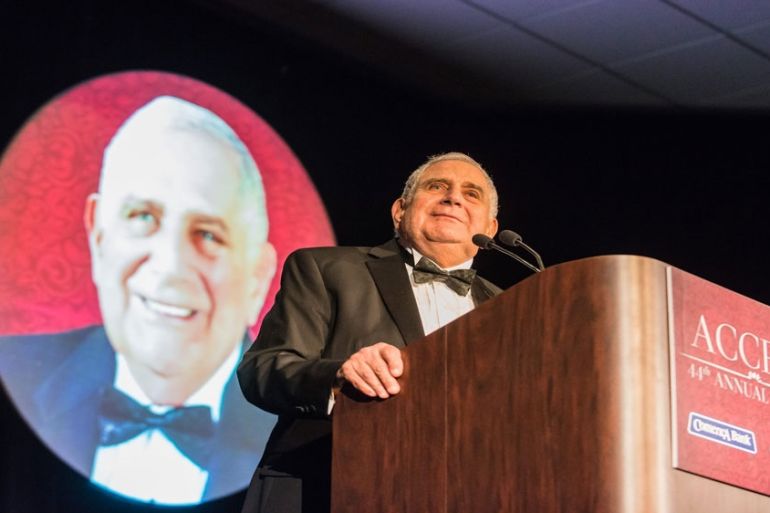Jack Shaheen inspired me even before I learned to read
The American writer devoted most of his life to combating the negative portrayal of Arabs and Muslims in film.

Jack Shaheen featured prominently in my life from a very young age, and I was inspired by his work even before I was old enough to read.
When I heard that he passed away, I felt as though I had lost a member of my family.
Keep reading
list of 4 itemsWall Street Journal cuts Hong Kong staff, shifts focus to Singapore
Abu Dhabi-backed group ends bid to take over Telegraph newspaper
Two Russian journalists arrested over alleged work for Navalny group
I remember seeing The TV Arab on my parents’ bookshelf as a child, shortly after we moved from Lebanon to the United States. Even though I was only five years old at the time, I knew there was something wrong with the scary-looking caricature on the cover.
But it wasn’t until I watched Delta Force (1986) with Chuck Norris two years later that I started to understand the focus of Shaheen’s work and grasp its importance.
He was the son of Lebanese Christian immigrants who devoted most of his life to combating the overwhelmingly negative portrayal of Arabs and Muslims in film.
Arabs and Muslims in Hollywood
Over the years, I saw recurring examples of Arabs being demonised on the big screen. The trend was best exemplified by movies like Navy SEALs (1990), Patriot Games (1992), True Lies (1994), and Executive Decision (1998). By the time I graduated from high school, there was no doubt in my mind that Hollywood had a serious problem with its portrayal of Arabs and Muslims.
During my second year of college, I grudgingly bought tickets to watch a movie that would upset me more than any other up until that point. One of the main characters in The Siege (1998) shared my last name – the images of his family members being rounded up and placed in a makeshift prison camp struck a nerve.
Throughout the movie, Muslims were shown to have a complete disregard for humanity, so the happy ending when all the detainees were freed rang hollow for me and countless others.
OPINION: Jack Shaheen, a real pioneer
The trend continued in the post 9/11 era with TV shows like 24 and Homeland that brought the nasty caricature of Arabs and Muslims to living rooms all over the US. Shaheen’s work was becoming increasingly important and he moved quickly to finish his most enduring publication.
In Reel Bad Arabs: How Hollywood Vilifies a People, Shaheen dissected 1,000 films produced over the last 25 years; he concluded that 936 of those films had portrayed their Arab and/or Muslim characters in a negative light.
Shortly after I started working for Al Jazeera, I pitched a story about how celebrity diplomacy rarely ever applies to the Arab world (specifically on the question of Palestine). I was delighted when my pitch was approved, and even happier when Shaheen invited me to his home in Hilton Head for a sit-down interview.
I remember how excited I was as we pulled up to his driveway. He and his wife Bernice greeted us with smiles and open arms. Any nervousness I might have felt upon walking into his home was quickly overshadowed by his warmth and that smile that has touched so many people over the years. We chatted about all sorts of things while my cameraman set up the shot, and by the time we were ready to do the interview, I was completely at ease.
The interview ended up being the longest one I’ve done so far in my 15 years as a journalist. His third book, Guilty: Hollywood’s Verdict on Arabs after 9/11, had just been published the year before, so he had a lot to say. But I had many more questions to ask, questions that had very little to do with my assignment. He was full of wisdom and I wanted to take in as much of it as I possibly could.
Challenge status-quo
He told me that it’s up to Arab Americans to challenge the status-quo in pop culture.
“We don’t have a lobby in LA,” he said back in 2009. “We have several Arab American and Muslim American lobbies in DC, but there are two centres of power in the world: Washington and Hollywood.”
Shaheen was a firm believer that the only way for Arabs and Muslims to rehabilitate our image on the big screen is for more of us to become part of the Hollywood machine. He agreed that much progress on that front has been made in recent years, but he also acknowledged that there’s still a very long way for us to go.
The last time we spoke was right before Donald Trump was elected president. I wanted to talk to him about what challenges still remained and how they might best be overcome. Although he was busy working on yet another project, he made the time for me yet again.
Soon after news broke of his passing, I realised that I was not alone in feeling I had lost someone close to me. He had left a mark on so many of my friends and colleagues over the years, whether through the Jack G Shaheen Mass Communications Scholarship Award, or simply his warm and welcoming nature. His door was always open to us, and he will be sorely missed.